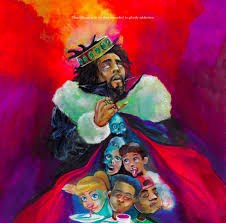J. Cole’s ‘KOD’ tackles society

J. Cole P&D Record Label
The album cover of J. Cole’s KOD. J. Cole, Mark Pellizzer, and T-Minus produced this album.
October 1, 2018
The boldest voice in the rap game has once again blessed our ears with America’s harsh realities using unmatched lyrics and musicality. J. Cole’s new album, “KOD,” touches on many issues in the black community such as drug abuse, black-on-black crime, relationships, education and stereotypes. The album further exemplifies that Cole is a lyrical activist.
The top songs in the album are “Photograph”, “ATM”, “Motiv8” and “Kevin’s Heart.”
In the opening piece, “Intro,” J. Cole vaguely introduces his album. Giving very little details, he leaves the listener thirsty for more. He then transitions into the song “KOD” which is him bragging on his style compared to other rappers: “If practice made perfect, I’m practice’s baby.” In a sense, it kind of makes fun of what other rappers sound like by using a trap-style beat thus proving his superiority over them.
His song “Photograph” addresses an issue prominent in our generation: catfishing. It is about his attraction to a woman who he has never seen in person. He compliments her consistently about her class and perfection, but he can’t love her because those are only impressions he has assumed based on the pictures he has seen.
Staying on the subject of love, in the song “Kevin’s Heart” (which is my personal favorite), Cole explains the temptations of cheating while he’s in a relationship because of his fame.
The song “BRACKETS” tackles the government by stating certain people use their hard earned money for taxes and don’t get any benefits from it. He further explains tax money is used to make improvements to all areas but black communities. He adds that even people who receive government benefits are only below the poverty line because of the government.
He addresses drug abuse in “Once an Addict” by telling a story of his drug-addicted mother. He tells how he used to avoid being at home because he hated seeing his mother in such a terrible state. “I’d rather run the streets than to see her kill herself,” Cole says. This song also touches on the conflicting relationship between parents and their children in times of hardship.
Likewise, he talks about drug abuse in “FRIENDS” but in a larger way. He explains that the drug abuse problems in the black community derive from the depression and anxiety many black children endure because of living conditions, bullying, parent issues and peer pressure. It is true that people of all ages and races go through these things, but Cole explains that getting professional help for these problems is not the nature of the black community; therefore, they resort to drugs. He explains it in the following lines:
“There’s all sorts of trauma from drama that children see
Type of stuff that normally would call for therapy
But you know just how it go in our community
Keep it all inside it don’t matter how hard it be”
Whether you agree with the ideals that the album portrays or not, you have to give credit where it’s due. Someone has to be to be bold enough to voice their opinion, so of course, it has to be the dauntless J. Cole. Overall, I would say that this is his second best album behind “2014 Forest Hills Drive,” but this album wasn’t about making hits. It was about making statements.








